 The BBC has let rip with a new beta service that invites Web developers and designers outside of the organisation to start fiddling about with their content and “create cool new things”.
The BBC has let rip with a new beta service that invites Web developers and designers outside of the organisation to start fiddling about with their content and “create cool new things”.
Launching in the summer, the BBC Backstage site gives code monkeys, app writers and graphics types the opportunity to bend and twist BBC digital content into new shapes.
The project lets developers get their greasy mitts on a collection of feeds and other tools for “re-mixing” and re-purposing the BBC’s offerings in different ways.
“We want to promote innovation and creativity on the net by opening access to some of BBC’s content and services,” enthused co-project leader Ben Metcalfe.
“Essentially, backstage.bbc.co.uk is enabling developers to create new contexts and user experiences around BBC content, like creating alternative ways to navigate, or remixing it with content and services from other providers like Yahoo,” he continued.
 The UK broadcasting goliath made a commitment to support social innovation in response to last year’s Graf Report, and this is echoed in their plans to develop an open community where people can share expertise, ideas, and collaborative efforts.
The UK broadcasting goliath made a commitment to support social innovation in response to last year’s Graf Report, and this is echoed in their plans to develop an open community where people can share expertise, ideas, and collaborative efforts.
Contributors can join an email discussion and chat away with technical and design staff from the BBC’s new media departments.
The BBC is hoping that by letting creatives fiddle about with their innards, fun, innovative and just plain bonkers new ways of presenting content may emerge, with the possible spin-off of stimulating a UK market for creative venture capital.
By opening up its content feeds and its “API” – application program interface – the BBC hopes that anyone with the right skills can use the digital content to create new search tools, or groovy ways of displaying that content.
An API is essentially a set of computer protocols and tools for building software applications, and the BBC intends to release new APIs gradually, as negotiations with other parts of the BBC take place.
The project is open to just about anyone, and if some bright spark comes up with a particularly cunning idea, the BBC might take it further in collaboration with the developer.
 It’s not all about profit though, with the BBC hoping that contributors will create prototypes on their Web sites to be freely shared with others for non-commercial use.
It’s not all about profit though, with the BBC hoping that contributors will create prototypes on their Web sites to be freely shared with others for non-commercial use.
Users won’t be tied to the BBC either, so if a proposal looks interesting to a third party company, they are free to take them further too.
This approach makes particular sense for applications designed for a specific device – such as a PDA – on which the BBC couldn’t justify dishing out their precious licence fee money.
The beta launch this week is designed to get developers to come up with suggestions about the kind of material they’d like to fiddle about with.
Although it is a significant move for a major content provider like the BBC to publicly offer their APIs, Web big boys like Google and Yahoo have already taken the step of making their APIs available for programmers to create applications.
Opening up material to communities of developers can drive real innovation, although it should be noted that it’s not a free for all, with rules in place detailing what is permitted under the agreement.
“We want to identify online talent and exciting propositions that use that talent and showcase that to the world. We want people to have fun with our content as well,” explained Mr Metcalfe.
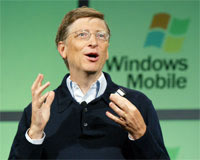 Microsoft ubermensch Bill Gates foresees mobile phones overtaking MP3s as the top choice among portable music players, while dismissing the popularity of Apple’s iPod player as unsustainable.
Microsoft ubermensch Bill Gates foresees mobile phones overtaking MP3s as the top choice among portable music players, while dismissing the popularity of Apple’s iPod player as unsustainable. “If you were to ask me which mobile device will take top place for listening to music, I’d bet on the mobile phone for sure,” Gates told the newspaper.
“If you were to ask me which mobile device will take top place for listening to music, I’d bet on the mobile phone for sure,” Gates told the newspaper. Xbox 360, Microsoft’s successor to their popular Xbox gaming console, will be “unleashed” tonight at a celebrity-packed launch broadcast on MTV, which shows at 8pm in the UK. It was launched on US MTV last night.
Xbox 360, Microsoft’s successor to their popular Xbox gaming console, will be “unleashed” tonight at a celebrity-packed launch broadcast on MTV, which shows at 8pm in the UK. It was launched on US MTV last night. The Xbox will ship with a 12X dual-layer DVD-ROM drive – supporting progressive-scan DVD movies and a host of DVD and CD formats – three USB 2.0 ports, two memory unit slots and support for four wireless game controllers.
The Xbox will ship with a 12X dual-layer DVD-ROM drive – supporting progressive-scan DVD movies and a host of DVD and CD formats – three USB 2.0 ports, two memory unit slots and support for four wireless game controllers. “Xbox 360 marks the beginning of a renaissance in video games,” whooped Don Mattrick, president of Worldwide Studios for Electronic Arts. “The unbelievable Xbox 360 games in development at Electronic Arts will accelerate the industry’s mission to make video games the pre-eminent form of all entertainment.”
“Xbox 360 marks the beginning of a renaissance in video games,” whooped Don Mattrick, president of Worldwide Studios for Electronic Arts. “The unbelievable Xbox 360 games in development at Electronic Arts will accelerate the industry’s mission to make video games the pre-eminent form of all entertainment.” Naturally, gamers love to customise their experience, so there’s a camera option to let vain players add their mugshots into games or even see their friends onscreen as they frag them to an inch of their worthless lives.
Naturally, gamers love to customise their experience, so there’s a camera option to let vain players add their mugshots into games or even see their friends onscreen as they frag them to an inch of their worthless lives. Xbox 360 players can also access recorded TV and digital movies, music, video and photos stored on Windows XP Media Center Edition 2005-based PCs through any Xbox 360 system in the house.
Xbox 360 players can also access recorded TV and digital movies, music, video and photos stored on Windows XP Media Center Edition 2005-based PCs through any Xbox 360 system in the house. Telewest Broadband today announced plans to transform its TV service, giving consumers greater access and control over additional digital programmes.
Telewest Broadband today announced plans to transform its TV service, giving consumers greater access and control over additional digital programmes. There will also be a mix of free and subscription services including popular TV series, music videos and niche content.
There will also be a mix of free and subscription services including popular TV series, music videos and niche content. Eric Tveter, president and chief operating officer at Telewest sunk deeper into his deluxe executive chair and glossed: “We are transforming TV as we know it by giving consumers both a superb choice of programmes and the flexibility to watch them whenever they want. We don’t ever want to hear our customers say there’s nothing on the box or that they have missed their favourite programme.”
Eric Tveter, president and chief operating officer at Telewest sunk deeper into his deluxe executive chair and glossed: “We are transforming TV as we know it by giving consumers both a superb choice of programmes and the flexibility to watch them whenever they want. We don’t ever want to hear our customers say there’s nothing on the box or that they have missed their favourite programme.” Microsoft has unveiled Windows Mobile 5.0, a new version of its Windows operating system for mobile devices.
Microsoft has unveiled Windows Mobile 5.0, a new version of its Windows operating system for mobile devices.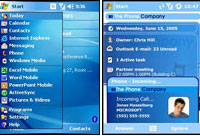 Although the underlying software code remains 90 percent the same as its predecessors, the new Windows Mobile removes some technological distinctions that gave the phone and PDA platforms different capabilities.
Although the underlying software code remains 90 percent the same as its predecessors, the new Windows Mobile removes some technological distinctions that gave the phone and PDA platforms different capabilities.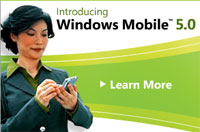 Swivel action business folks will appreciate updates to the mobile versions of Microsoft Word and Excel, with the software providing more consistent formatting of documents created on a computer and allowing charts to be created from a spreadsheet.
Swivel action business folks will appreciate updates to the mobile versions of Microsoft Word and Excel, with the software providing more consistent formatting of documents created on a computer and allowing charts to be created from a spreadsheet.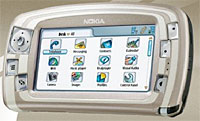 NTL Broadcast and O2 have revealed the first batch of channels to be part of their forthcoming mobile TV trial in the Oxford area, announcing an initial 16 channels including Cartoon Network, CNN, Discovery Channel, Sky Sports News and Sky Travel.
NTL Broadcast and O2 have revealed the first batch of channels to be part of their forthcoming mobile TV trial in the Oxford area, announcing an initial 16 channels including Cartoon Network, CNN, Discovery Channel, Sky Sports News and Sky Travel.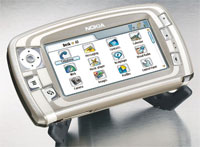 To support the trial, NTL Broadcast is building a new broadcast network of eight DVB-H transmitters to cover 120 square km around Oxford that will enable the lucky participants to receive digital television on the move. To enable a commercial service to be launched in the UK, Ofcom will need to license spectrum and O2 is already lobbying the UK regulator to bring forward plans to distribute radio frequencies for mobile TV services.
To support the trial, NTL Broadcast is building a new broadcast network of eight DVB-H transmitters to cover 120 square km around Oxford that will enable the lucky participants to receive digital television on the move. To enable a commercial service to be launched in the UK, Ofcom will need to license spectrum and O2 is already lobbying the UK regulator to bring forward plans to distribute radio frequencies for mobile TV services.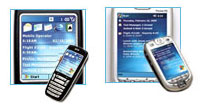 If you’ve ever accessed the Web through a mobile phone or PDA, you may be familiar with the annoyance of finding some sites inaccessible, hard to read or just a right royal pain in the Bluetooth.
If you’ve ever accessed the Web through a mobile phone or PDA, you may be familiar with the annoyance of finding some sites inaccessible, hard to read or just a right royal pain in the Bluetooth. “Web access today is so fundamental, that it shouldn’t be hampered by wires,” table-thumped Philipp Hoschka, W3C’s deputy director for Europe.
“Web access today is so fundamental, that it shouldn’t be hampered by wires,” table-thumped Philipp Hoschka, W3C’s deputy director for Europe.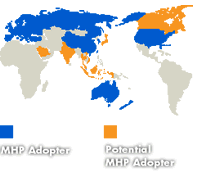 Across Europe, interactive services using the DVB Multimedia Home Platform (MHP) standard have been launched on cable, satellite and terrestrial platforms. While not formally mandated by the European Commission, MHP has been embraced as an open and interoperable standard that can be actively encouraged and promoted. Already, several countries have launched MHP-based interactive services on the terrestrial platform.
Across Europe, interactive services using the DVB Multimedia Home Platform (MHP) standard have been launched on cable, satellite and terrestrial platforms. While not formally mandated by the European Commission, MHP has been embraced as an open and interoperable standard that can be actively encouraged and promoted. Already, several countries have launched MHP-based interactive services on the terrestrial platform.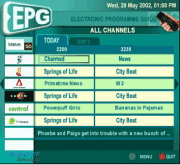 In Austria, a DTT trial with MHP-based interactive services provided 150 households in Graz with access to an interactive television service called !TV4 using the telephone connection for the return channel. Using their television remote control, viewers could retrieve information services and vote. Given the success of the trial, it is likely that MHP-based interactive services will be launched alongside DTT services.
In Austria, a DTT trial with MHP-based interactive services provided 150 households in Graz with access to an interactive television service called !TV4 using the telephone connection for the return channel. Using their television remote control, viewers could retrieve information services and vote. Given the success of the trial, it is likely that MHP-based interactive services will be launched alongside DTT services. Of course MHP is not the only interactive television service system in the market. Proprietary systems such as MediaHighway and OpenTV have been installed in a large number of set-top boxes, often for cable and satellite platforms. In the United Kingdom, the MHEG standard is widely used on the terrestrial platform. As a result of the various products and services in the market, the DVB Project has been working on the development of the Portable Content Format (PCF) to deliver a wide range of interactive television services to multiple platforms with a minimum of re-authoring. It has significant interest for operators who wish to migrate towards MHP by allowing them to manage simultaneously a mixed population of devices.
Of course MHP is not the only interactive television service system in the market. Proprietary systems such as MediaHighway and OpenTV have been installed in a large number of set-top boxes, often for cable and satellite platforms. In the United Kingdom, the MHEG standard is widely used on the terrestrial platform. As a result of the various products and services in the market, the DVB Project has been working on the development of the Portable Content Format (PCF) to deliver a wide range of interactive television services to multiple platforms with a minimum of re-authoring. It has significant interest for operators who wish to migrate towards MHP by allowing them to manage simultaneously a mixed population of devices.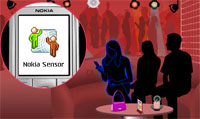 Going up to people and actually introducing yourself has become, like, so uncool with the introduction of the Nokia Sensor Bluetooth widget.
Going up to people and actually introducing yourself has become, like, so uncool with the introduction of the Nokia Sensor Bluetooth widget.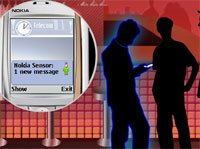 The Sensor app comes with the usual yoof-tastic features, like Buddy Alerts, which tells you if someone you know is nearby (isn’t that what eyes are for?) and ‘Group Codes’ which bleep when someone with similar interests is lurking in the area.
The Sensor app comes with the usual yoof-tastic features, like Buddy Alerts, which tells you if someone you know is nearby (isn’t that what eyes are for?) and ‘Group Codes’ which bleep when someone with similar interests is lurking in the area. The BBC has opened up its RSS news feeds to commercial Websites for the first time, with a new set of terms and conditions letting other sites integrate the BBC feeds for free, and free from offline contractual negotiation.
The BBC has opened up its RSS news feeds to commercial Websites for the first time, with a new set of terms and conditions letting other sites integrate the BBC feeds for free, and free from offline contractual negotiation. Pete Clifton, editor of the BBC News Website said: “Liberating the availability of our content for re-use is an important step for the BBC. We’ve been a bit cautious about it up to now but there’s a real demand for us to provide this service. If we are to build public value it’s important that we respond to this demand.”
Pete Clifton, editor of the BBC News Website said: “Liberating the availability of our content for re-use is an important step for the BBC. We’ve been a bit cautious about it up to now but there’s a real demand for us to provide this service. If we are to build public value it’s important that we respond to this demand.”